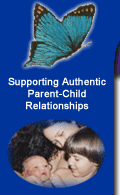
Articles
Thanks so much for sharing you wisdom with our readers. You are truly a blessing on the planet."
—An editor NAP Seattle

Naomi Aldort Library
 And They Played All Day
And They Played All Day
 Getting Out of the Way
Getting Out of the Way
 Helping Children Resolve Emotional Hurts
Helping Children Resolve Emotional Hurts How Children Learn Manners
How Children Learn Manners How to Give Advice to Children
How to Give Advice to Children
 Surviving the Toddler Years
Surviving the Toddler Years Toddlers: To Tame or to Trust
Toddlers: To Tame or to Trust The Ethics of Representing Childhood in Western Culture
The Ethics of Representing Childhood in Western Culture
 When Toddlers Bite
When Toddlers Bite
 How to Soothe a Crying Baby
How to Soothe a Crying Baby
 Taming the Tiger Mother
Taming the Tiger Mother

 Your Child is Like the Rain
Your Child is Like the Rain
 The Price of Praise - Part 1: Connecting to the Child's Own Feeling
The Price of Praise - Part 1: Connecting to the Child's Own Feeling
 The Price of Praise - Part 2: Expressing Appreciation
The Price of Praise - Part 2: Expressing Appreciation
 The Price of Praise - Part 3: Building Self-Confidence with Unconditional Love
The Price of Praise - Part 3: Building Self-Confidence with Unconditional Love Social Skills are Learned with Parents First
Social Skills are Learned with Parents First Beyond Validation: Raising Peaceful and Emotionally Resilient Children
Beyond Validation: Raising Peaceful and Emotionally Resilient Children
The Price of Praise
Part 1: Connecting to the Child's Own Feeling
By Naomi Aldort
Author of Raising Our Children, Raising Ourselves
Q: I have read your article in Mothering magazine about the harm of praise and became concerned. If I stop praising my child, he loses interest. What can I do instead of praise?
A: There is nothing to do "instead" of praise. Words that intend to make the child feel and do what we want are manipulative and carry the same price as other coercions: loss of intrinsic motivation, loss of self-trust, dependency on approval, damaged parent child relationship, lowered self-esteem, insecurity, disinterest, dishonesty, getting by with as little as possible, fear of challence, and more. This does not imply that we become indifferent; on the contrary, when free of the intent to impact the child's emotions, actions or behavior, a parent can generously express her appreciation and joy with her child freely and authentically.
Positive feelings and thoughts about a child or his actions can be expressed in four ways: Validation • Unconditional appreciation • Gratitude • Feedback (when requested.) None of these include praise as evaluation. It is not about good or bad, nice or ugly, but about using the opportunity of a child's self-satisfaction to be part of his joy, to appreciate, love or respond to his need for feedback. In part one on praise I will address the way to express feelings of joy and appreciation of your child: Validating his feelings of self-satisfaction.
A child wants to know that we are aware of his success and he wants to have a shared experience of his joy with us. When you praise with the intention to make an impact on your child's feelings or actions you are maneuvering his emotions, not relating to him. To connect with your son while appreciating him you need to connect with his expressed feelings rather than try to manufacture a feelings in him.
Cheering and evaluating a child can be confusing in variety of ways: A child's yearning to please her parents is so potent that she can be easily swayed away from her own path in her quest to live up to expectations; Her own sense may be far from your flattery, she may feel disappointed in her creation, embarrassed about her behavior, resentful that she has to do something, or puzzled by the undue fuss and then doubting her own ability to know herself.
A father related to me his memory of sitting as a little toddler on the top of a big slide contemplating coming down for the first time. He sat there for a while and then turned on his belly, feet first. The second he took off his parents cheered and clapped. He was still serious when he arrived at the bottom but not anymore due to contemplation but because he concluded that something was seriously wrong with him or else his parents wouldn't consider it a big deal that he could go down a slide. This conclusion was re-enforced by such repeat praise and stayed with him, limiting him as an adult in many ways.
The question is, what could this man's parents have done to express their appreciation without contradicting his inner experience? They could have validated the feeling that was already there; contemplation. After he made it down, they could have waited for him to express his self-satisfaction, and if he did, they could have then join his joyful expression without exaggerating or dramatizing it; maybe he would have laughed with delight and they would then laugh with him. Maybe he would have said with a grin on his face,"Did you see me coming down so fast?"and they could have smiled and said, "yes, I saw you sliding fast all the way." And, if he looked excited, they could have asked, "Are you feeling excited?"And yes, if he didn't express anything, it would have been best to say nothing. Later they can ask him how he enjoyed himself.
You may think that praise helps a child's self-esteem because he appears joyous. Yet, he is not happy but only relieved that he has again succeeded to get approval. He is becoming skillful, not at studying, but at living inauthentically. If your son stops studying or achieving something when you don't praise him, he is evidently not interested in the subject.
There is no difference between the evaluative praise and punishment in terms of being methods of manipulation. The fear of not getting the approval is just as intense as the fear of punishment. As with any manipulation method, the child does things for the wrong reason; to get the praise or avoid it's absence. The only "benefit" is to the adult who gains temporary control over the child. It is temporary because, being inauthentic, the action or behavior can only exist as long as the approval is dished out.
When your child expresses his joy with himself or his creation, you can empathize. You do so with words that convey your feelings without evaluation. You don't try to generate a feeling in your child but to reflect his joy and join his victory. For example, if your child expresses joy in his art work you don't evaluate the picture, but mirror the feelings that is already there with a smile or with words, "Are you excited about your picture? would you like to hang it on the wall?"You can also express your feelings freely, "When I look at it I am reminded of grandpa's apple tree house."
Weaning off the Addiction:
If your child is already conditioned to look for your evaluation and asks, "Is it good Dad?" you can mirror his need for your approval, "Are you feeling doubtful and do you need to know that your art is beautiful?" and you can add, "When you ask me to tell you if I like it I feel concerned because I would love to know that you can be pleased with yourself on your own." The weaning process can include open discussions on the topic.
When instructed "look at me" or "listen to my story" follow the instructions. You were not asked to evaluate, nor to "pump" good feelings. Look, listen and give attention. Children know what they want and they are assertive by nature (which parents often complain about.)
Even when your child chooses freely to study or to develop a skill you need not use praise to support him in his endeavor. When sensing our investment in his path a child may lose his own passion for it. More than once I empathize with parents whose child stopped his art, sport or music after receiving even one dramatic praise from the adults around him.
Using praise to modify behavior means that the child is not choosing to do what we wish, but only acting to please us while her needs are not being met. Such manipulation builds walls between people regardless of the method. Do not attempt to create a feeling and a behavior in another human being, instead, celebrate the way he is by reflecting the feelings that are already there.
©Copyright Naomi Aldort
Naomi Aldort is the author of, Raising Our Children, Raising Ourselves. Her advice columns are published in progressive parenting magazines worldwide. Aldort offers guidance by phone/Skype internationally regarding all ages, babies through teens: attachment parenting; natural learning; peaceful and powerful parent-child relationships, marriage, and more. Products, phone sessions, and free newsletter: www.authenticparent.com
Reproduction of material from any pages of
NaomiAldort.com site
is strictly prohibited without written permission.
©Copyright Naomi Aldort.
